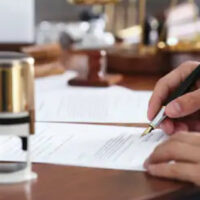The Florida Escheatment Process

Not many people are familiar with the word “escheatment” – but the idea or fear that you could lose property to the state upon your death, your loved ones never receiving what you would leave to them – is probably an idea as old as the country itself. If not older.
The Florida escheatment process is something everyone wants to avoid, and some make the mistake of burying their head in the sand, thinking what they don’t know can’t hurt them. On the contrary, learning about the escheatment process can help you and your loved ones avoid a negative experience. This article is meant to serve as a general discussion of the Florida escheatment process, for formal legal advice and an assessment of your own estate plan and goals, contact an experienced wills & probate attorney at Suncoast Civil Law.
Florida Escheatment Process
The Florida escheatment process allows the State of Florida to take possession of unclaimed property after someone dies. Escheatment is meant only to come into play as a last resort for dissolving an estate. Estate plans and intestate succession rules will both be applied before escheatment will take place. This means that Florida escheatment is generally triggered if a person passes away without having executed a valid last will and testament or trust, and there are no living, identified, found heirs to receive the assets.
Property that Florida claims through the escheatment process will eventually be sold, the proceeds deposited into Florida’s State School Fund. However, within 10 years of that deposit, a person can file a claim to the unclaimed, “escheated” property in Florida Probate Court.
A properly filed claim can reopen the administration of the deceased’s estate, and enables the filer to establish the basis of their claim on the estate. You can also authorize another party, such as a Florida probate attorney, to receive the proceeds on your behalf. This can help filers to avoid the cost of traveling to Florida for out-of-state claimants.
How Escheatment Can Occur
Some circumstances that can result in escheatment include:
- Financial accounts created after the formation of an estate plan, and thereby go undiscovered.
- Unmarried, childless individuals pass away without having created an estate plan
- Assets are left to a person’s ex-spouse from estate plans written prior to divorce (divorces generally state that an ex-spouse cannot inherit)
- IRAs or life insurance policies with outdated beneficiary designations
- Despite notices issued, family members or will beneficiaries cannot be located.
It is easy to see how some or all of a person’s property could end up transferring to the state in the situations above. As noted above, escheatment itself does not divest, or take away, from an heir or beneficiary’s rights to the escheated property. So long as a claim is properly filed within 10 years, the value of that property is still claimable by the rightful heirs.
How to Prevent Escheatment in Your Estate
Careful estate planning can help to ensure that none of your property or legacy falls through the cracks. To help your own estate assets avoid escheatment, it might be wise to:
- Identify beneficiaries by class (“my children”) to avoid accidental omissions of individuals
- Name alternative beneficiaries in the event the named beneficiary predeceases the testator.
- Include residuary clauses, meant to sweep up any remaining, not-specifically-listed asset and award them to a named party.
These are just some of the ways that careful estate planning can help. For specific, formal advice, contact Suncoast Civil Law.
Contact Suncoast Civil Law
An esteemed Sarasota wills & probate attorney at Suncoast Civil Law can assist in reclaiming escheated property, and in building an estate plan that helps your assets avoid the process altogether. Contact our experienced team today to begin discussing your own case and circumstances.
Sources:
heraldtribune.com/story/news/2025/03/14/unclaimed-property-how-find-missing-money-florida/82358894007/
floridapolitics.com/archives/738608-11th-circuit-vacates-lower-court-ruling-on-florida-unclaimed-property-registry/
